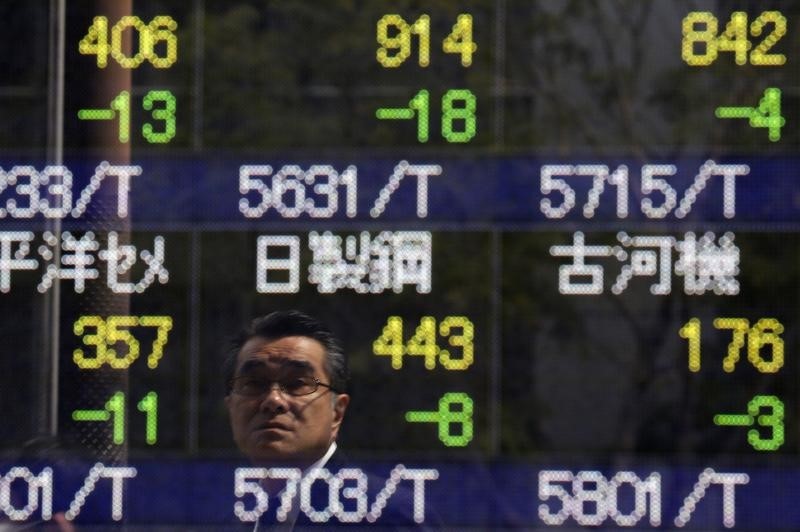* Ex-Japan Asia MSCI up 0.2 pct, Nikkei down 0.5 pct
* Volatility index hits high since Feb
* China, U.S. shares among worst performer this week
By Hideyuki Sano
SINGAPORE, Oct 12 (Reuters) - Asian shares appeared tentative on Friday, holding steady after a nine-day losing streak, but sentiment was frail after Wall Street shares crumbled and expectations of market volatility shot up to an eight-month high.
Worries about the economic impact of a Sino-U.S. trade war, a spike in U.S. bond yields this week and caution ahead of earnings seasons are all cited as potential reasons behind the selloff, the biggest market rout since February.
MSCI's broadest index of Asia-Pacific shares outside Japan .MIAPJ0000PUS rose 0.2 percent after the opening of the South Korea and Australian markets, a day after it fell 3.6 percent to hit 1-and-a-1/2 year low.
Japan's Nikkei .N225 fell 0.6 percent.
The U.S. S&P 500 .SPX lost 2.06 percent on Thursday to a three-month low, following on from a 3.29 percent drop on Wednesday.
U.S. stock futures rebounded 0.6 percent in early Asia on Friday, in part helped by media report that the U.S. Treasury Department will not call China a currency manipulator in an upcoming report.
"The (U.S. share) market is now about seven percent off of its 100-day high, but this is far from a rare occurrence historically. Indeed, history is littered with over five percent-ish type selloffs in the midst of economic expansions," wrote economists at RBC Capital Markets.
Still, sentiment remains shaky with the Cboe Volatility index .VIX rising to 24.98, its highest close since Feb. 12, a day after the S&P 500 fell more than 3 percent.
"There still appears to be downside risk to the market amid worries the Sino-U.S. trade war may be slowing down global growth," said Masahiro Ichikawa, senior strategist at Sumitomo Mitsui Asset Management in Tokyo.
Indeed, so far this week Chinese and U.S. shares are among the worst performers in a sign that investors' worries about the trade war are deepening.
MSCI's China A-shares index .MICNA0000PUS is down almost 10 percent while MSCI's U.S. index .MIUS00000PUS shed 5.5 percent, compared with a 4.9 percent fall for MSCI's gauge of stock performance in 47 countries .MIWD00000PUS .
Gold XAU= , typically seen as a safe-haven asset at times of high uncertainty, jumped 2.5 percent, its biggest daily gain since June 2016.
Flight-to-quality bids boosted prices of U.S. Treasury bonds, pushing down yields. The yield on 10-year notes fell to 3.146 percent US10YT=RR , off a seven-year high of 3.261 percent touched on Tuesday on fears about inflation.
The fall in U.S. yields helped push the dollar lower as it undermines the attraction of investments in dollar bonds.
The euro traded at $1.1593 EUR= , after a gain of 0.65 percent on Thursday.
The yen JPY= hit a three-week high of 111.83 to the dollar on Thursday and last stood at 112.06.
The Chinese yuan also gained about 0.65 percent in offshore trade CNH=D4 to 6.8817 to the dollar, rebounding from an eight-week low set earlier on Thursday.
Oil prices slumped to more than two-week lows.
Brent crude futures LCOc1 fell $2.83 on Thursday to settle at $80.26 a barrel, a 3.4 percent loss, after hitting a low of $79.80, the weakest since Sept. 24. The global benchmark has retreated after hitting a four-year high of $86.74 on Oct. 3. Brent last stood at $80.33.
<^^^^^^^^^^^^^^^^^^^^^^^^^^^^^^^^^^^^^^^^^^^^^^^^^^^^^^^^^^^ MSCI, Nikkei datastream chart
http://reut.rs/2sSBRiD
^^^^^^^^^^^^^^^^^^^^^^^^^^^^^^^^^^^^^^^^^^^^^^^^^^^^^^^^^^^>
